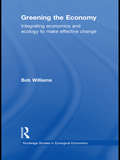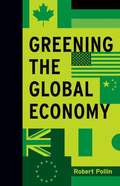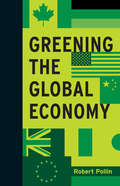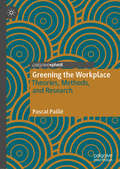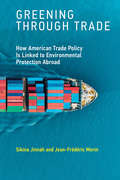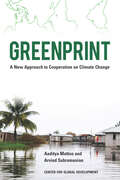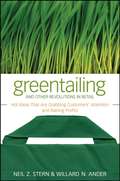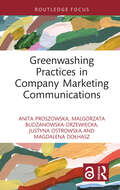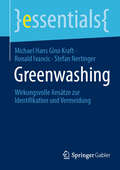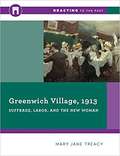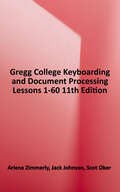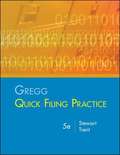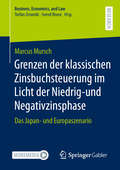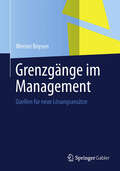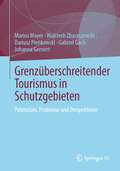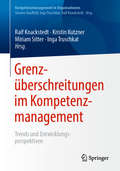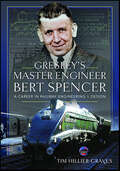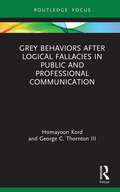- Table View
- List View
Greening the Economy: Integrating Economics and Ecology to Make Effective Change
by Robert B. WilliamsProfessor Bob Williams examines the essential elements that give ecosystems their durability. These key characteristics are: self-regulating cycles of key materials, a plentiful and durable energy source, an ability to adjust to changing circumstances, and the capacity for resiliency in the face of unpredictable disruptions. In separate chapters, each of these natural attributes are applied to our economy and 20 polices are recommended to shift our economy toward each of these objectives. The policies include marketable waste emission permits, a "carbon" tax, split-rate property taxation, environmental assurance bonds, a revamped home mortgage deduction, and an inheritance tax. These policies function to implement the principle of full-cost pricing in order to ensure market incentives that encourage environmentally temperate behaviour and decisions. This book will be of interest to students of Ecology and Economics, at undergraduate and postgraduate level alike, as well as anyone seeking an understanding of key ecological concepts that are critical to fully appreciating the role of natural capital in our economic affairs
Greening the Global Economy
by Robert PollinIn order to control climate change, the International Panel on Climate Change (IPCC) estimates that greenhouse gas emissions will need to fall by about forty percent by 2030. Achieving the target goals will be highly challenging. Yet in Greening the Global Economy, economist Robert Pollin shows that they are attainable through steady, large-scale investments -- totaling about 1.5 percent of global GDP on an annual basis -- in both energy efficiency and clean renewable energy sources. Not only that: Pollin argues that with the right investments, these efforts will expand employment and drive economic growth.Drawing on years of research, Pollin explores all aspects of the problem: how much energy will be needed in a range of industrialized and developing economies; what efficiency targets should be; and what kinds of industrial policy will maximize investment and support private and public partnerships in green growth so that a clean energy transformation can unfold without broad subsidies. All too frequently, inaction on climate change is blamed on its potential harm to the economy. Pollin shows greening the economy is not only possible but necessary: global economic growth depends on it.
Greening the Global Economy (Boston Review)
by Robert PollinA program for building a global clean energy economy while expanding job opportunities and economic well-being. In order to control climate change, the International Panel on Climate Change (IPCC) estimates that greenhouse gas emissions will need to fall by about forty percent by 2030. Achieving the target goals will be highly challenging. Yet in Greening the Global Economy, economist Robert Pollin shows that they are attainable through steady, large-scale investments—totaling about 1.5 percent of global GDP on an annual basis—in both energy efficiency and clean renewable energy sources. Not only that: Pollin argues that with the right investments, these efforts will expand employment and drive economic growth. Drawing on years of research, Pollin explores all aspects of the problem: how much energy will be needed in a range of industrialized and developing economies; what efficiency targets should be; and what kinds of industrial policy will maximize investment and support private and public partnerships in green growth so that a clean energy transformation can unfold without broad subsidies. All too frequently, inaction on climate change is blamed on its potential harm to the economy. Pollin shows greening the economy is not only possible but necessary: global economic growth depends on it.
Greening the Workplace: Theories, Methods, and Research
by Pascal PailléThe phrase “greening of the workplace” refers to the range of resources used by an organization to ensure its management and industrial processes are conducive to the adoption of workplace pro-environmental behaviors by its employees, irrespective of their position, the nature of their work or their rank within the organization. This book provides greater visibility to research into how organizations encourage their employees to take environmental considerations into account in their daily work. It examines the connections between organizational practices, individual behaviors, and environmental performance. This book will appeal to HRM scholars interested in the psychological, managerial and organizational dimensions governing the relationship between individuals and ecology.
Greening through Trade: How American Trade Policy Is Linked to Environmental Protection Abroad (The\mit Press Ser.)
by Sikina Jinnah Jean-Frederic MorinHow the environmental provisions in US preferential trade agreements affect both the environmental policies of trading partners and the effectiveness of multilateral environmental agreements.As trade negotiations within the World Trade Organization seem permanently stalled, countries turn increasingly to preferential trade agreements (PTAs) between smaller groups of nations. Many of these PTAs incorporate environmental provisions, some of which require trading partners to enact new domestic environmental laws, and use the enforcement mechanisms available within trade agreements as tools for environmental protection. In Greening through Trade, Sikina Jinnah and Jean-Frédéric Morin provide the first detailed examination of how the environmental provisions in US preferential trade agreements affect both the environmental policies of trading partners and the effectiveness of multilateral environmental agreements. They do so through a combination of in-depth qualitative case studies and quantitative analysis of an original dataset of 688 global PTAs. Jinnah and Morin explore the effects of linkages between PTAs and environmental treaties and the diffusion of environmental norms and policy through PTAs. Centrally, they argue that US trade agreements can serve as mechanisms both to export environmental policies to trading partner nations and third-party countries and to enhance the effectiveness of multilateral environmental agreements by strengthening their enforcement capacity. They caution that PTAs are not a panacea for environmental governance; deeper problems of unsustainable consumption and differential power dynamics between trading partners must be carefully navigated in deploying trade agreements for environmental protection.
Greenprint
by Aaditya Mattoo Arvind SubramanianBeleaguered by mutual recrimination between rich and poor countries, squeezed by the zero-sum arithmetic of a shrinking global carbon budget, and overtaken by shifts in economic and hence bargaining power between these countries, international cooperation on climate change has floundered. Given these three factors-which Arvind Subramanian and Aaditya Mattoo call the "narrative," "adding up," and "new world" problems-the wonder is not the current impasse; it is, rather, the belief that progress might be possible at all.In this book, the authors argue that any chance of progress must address each of these problems in a radically different way. First, the old narrative of recrimination must cede to a narrative based on recognition of common interests. Second, leaders must shift the focus away from emissions cuts to technology generation. Third, the old "cash-for-cuts" approach must be abandoned for one that requires contributions from all countries calibrated in magnitude and form to their current level of development and future prospects.
Greenspan, an Enviable Record: Greenspan's Successes as Fed Chairman
by Ethan S. HarrisIn the latter half of his Fed chairmanship, Greenspan was considered the rock star of the economic and financial world. This chapter looks at the successes that propelled him to iconic status.
Greenspan, to Err is Human: The Downside of Greenspan's Chairmanship
by Ethan S. HarrisAlan Greenspan surely deserves credit for the strong performance of the economy during his Fed chairmanship, but he also had some notable mistakes, including thrusting himself unnecessarily into political matters and failing to respond to bubbles in asset markets.
Greenspan: The Case for the Defence
by Edward L. Greenspan George JonasCriminal lawyer Eddie Greenspan is one of Canada's most publicized and least understood personalities. Colourful, controversial, influential, outrageous, he is both loved and hated. An account of a 20 year period in his life.
Greentailing and Other Revolutions in Retail: Hot Ideas That Are Grabbing Customers' Attention and Raising Profits
by Willard N. Ander Neil Z. SternAn introduction to greentailing and the five other biggest trends in the retail business In their newest book on retailing, authors Stern and Ander examine the revolutions occurring in the retail marketplace, with particular emphasis on the influential green trend in retailing, or Greentailing. Greentailing is capitalizing on the huge and growing demand for organic, sustainable and wellness-related products. As it evolves, greentailing will force both suppliers and retailers alike in every category to take notice. Leading edge greentailers like Whole Foods and Wal*Mart continue to grow and innovate at rates much faster than traditional competitors, and are forcing competitive responses. The authors explain how any retail store or manufacturer can implement these ideas and raise profits, using case studies from successful greentailers. In addition to greentailing, the book examines five other top retail trends: Demographic Shifts Provide Retail Opportunities Moving Up the Ladder--Growth of Experiential Retailing--How to Drive Sales and Profits Beyond Price Getting Outside the Box--New Ways to Reach the Consumer--The Growth of Non-Store Retailing Selling Services, Not Just products Brands Going Retail--The Battle for Control of the Customer Very much a follow up to their first book, Winning at Retail: Developing a Sustained Model for Retail Success, Greentailing and Other Revolutions in Retail addresses all the latest trends in the retail industry and presents unbeatable advice on quickly responding to changes in customer demographics and competition. Retail is all about the customer, and as customers and their tastes change, this one-of-a-kind resource shows retailers and manufacturers how to keep up and innovate.
Greenwashing Practices in Company Marketing Communications (Routledge Focus on Environment and Sustainability)
by Anita Proszowska Małgorzata Budzanowska-Drzewiecka Justyna Ostrowska Magdalena DołhaszThis book explores greenwashing practices in company marketing communications, outlining the different types of greenwashing and recommending strategies for readers to successfully differentiate between greenwashing and green marketing.It reviews the theoretical and practical concepts of greenwashing – focusing on those related to marketing communication and marketing strategy – and highlights the various tools companies utilise to mislead their customers, including green advertising, green packaging, eco-labelling, AI, and social media. Drawing upon specific case study examples, the volume illustrates how and when companies employ these methods and the subsequent impact on the environment, while contrasting these with best practices in ethical, pro-environmental marketing communications. Overall, the book campaigns for increased awareness of greenwashing among stakeholders and outlines a proposal for controlling the implementation of pro-environmental practices in green marketing communication to ensure that consumers are not misled.Assisting readers in easily identifying truly green products, as well as those which have been marketed inaccurately, Greenwashing Practices in Company Marketing Communications will be useful for researchers, academics, and students analysing contemporary marketing communication and its compatibility with the principles of sustainable development.
Greenwashing: Wirkungsvolle Ansätze zur Identifikation und Vermeidung (essentials)
by Stefan Nertinger Michael Hans Kraft Ronald Ivancic"Tue Gutes und sprich darüber" – aber wie funktioniert das glaubwürdig? Das essential beleuchtet verschiedene Facetten des Greenwashings, bei denen Aktivitäten irreführend ein höheres Maß an Engagement suggerieren, als tatsächlich vorhanden ist. Ausgehend von der Analyse der Dilemmata der Nachhaltigkeitskommunikation werden Instrumente und Ansätze aufgezeigt, wie diese praxistauglich überwunden werden können. Für Organisationen wird ein Selbstevaluationstool aufgezeigt, auf Basis dessen die richtigen Hebel zur Vermeidung und Schadensprävention von Greenwashing angewandt werden können.
Greenwich Village 1913: Suffrage, Labor, And The New Woman
by Mary Jane TreacyIn this Reacting to the Past game, the classroom is transformed into Greenwich Village in 1913, where rebellious “free spirits” gather. Exposed to ideas like woman suffrage, socialism, birth control, and anarchism, students experiment with forms of political participation and bohemian self-discovery. Reacting to the Past is an award-winning series of immersive role-playing games that actively engage students in their own learning. Students assume the roles of historical characters and practice critical thinking, primary source analysis, and argument, both written and spoken.
Greg Mazur and the Purchase of Great Eastern Premium Pet Foods
by Richard S. Ruback Royce YudkoffGreg Mazur decided to purchase a small business after graduating from the Harvard Business School. The case explores his decision about whether or not he should finalize his deal to purchase Great Eastern Premium Pet Foods, Inc. ("GEPP"). It gives students the opportunity to consider his search process, his due diligence about the company, his post-purchase plans, his valuation analysis and the structure of the potential transaction.
Gregg College Keyboarding & Document Processing Lessons 1-60 11th Edition
by Scot Ober Arlene Zimmerly Jack JohnsonGDP/11 is an integrated keyboarding system designed to process and score documents created in Microsoft Word. Together, this book and software systematically lead students through each lesson to provide an easy path to success.
Gregg Quick Filing Practice: Student Text Guide
by Jeffrey Robert Stewart Barbara W. TrentThis kit provides training in the methods of paper and computer filing. The text is simulation―the user is a new employee of the fictional Online Printing Services and must complete are series of tasks and exercises with the mock filing kit. Fifth Edition
Grenada: Request for a Three-Year Arrangement Under the Poverty Reduction and Growth Facility--Staff Report; and Press Release on the Executive Board Discussion
by International Monetary FundA report from the International Monetary Fund.
Grenada: Statistical Appendix
by International Monetary FundA report from the International Monetary Fund.
Grenzen der klassischen Zinsbuchsteuerung im Licht der Niedrig-und Negativzinsphase: Das Japan- und Europaszenario (Business, Economics, and Law)
by Marcus MurschDie Zinsbuchsteuerung mittelständischer Kreditinstitute stößt in Zeiten sehr niedriger bzw. negativer Zinssätze an Grenzen. Ein nachhaltiger Zinsanstieg ist aktuell nicht zu erwarten und auch die Prognosen vieler Experten gehen von einem nachhaltig niedrigen Zinsniveau aus. Es wird bereits von japanischen Verhältnissen mit einem Zinssatz nahe Null über Jahrzehnte gesprochen. In diesem Kontext erfolgt eine Analyse, in welchem Umfang dieses Szenario Auswirkungen auf das Betriebsergebnis vor Bewertung eines mittelständischen Kreditinstituts hat. Über das Basisszenario Japan erfolgt auf Grundlage von Echtdaten ein Forecast bis in das Jahr 2031. Mit dem Extremszenario Europa werden die entsprechenden Daten zudem gestresst. Hierbei werden methodische Schwächen der klassischen Zinsbuchsteuerung offengelegt und darüber hinaus Lösungsansätze und Denkanstöße geliefert. Durch diese Zukunftsanalysen kommt der Autor zu dem Ergebnis, dass ein Handeln zwingend notwendig ist.
Grenzgänge im Management
by Werner BoysenWelche Parallelen lassen sich zwischen dem Triathlon und dem Managen von Unternehmen ziehen? Welche Erkenntnisse für gutes Management können aus der Stauforschung gewonnen werden? Was haben psychosomatische Störungen und managementbedingte Fehlentwicklungen in Unternehmen gemeinsam? Diese und 17 weitere spannende Analogien greift Werner Boysen in seinem Buch auf, um Impulse für ganzheitlich angelegtes, nachhaltiges Management zu geben. Der Blick über den eigenen Tellerrand hinaus sowie übergreifendes Denken und Handeln werden in einer dynamischen und komplexen Wirtschaftswelt zum wesentlichen Erfolgsfaktor. Neben den betriebswirtschaftlichen Grundlagen und dem sicheren Umgang mit etablierten Methoden der Unternehmensführung zählen Erfahrung und innovative Ideen zum Handwerkszeug eines guten Managers. Dieses Buch bietet interessante Impulse sowie Quellen für neue Ideen im Management und stellt bewährte Kreativtechniken bereit, die das Denken in Analogien anregen.
Grenzüberschreitender Tourismus in Schutzgebieten: Potenziale, Fallstricke und Perspektiven
by Marius Mayer Wojciech Zbaraszewski Dariusz Pieńkowski Gabriel Gach Johanna GernertDieses Buch erörtert, wie der Tourismus zwischen Nachbarländern wie Polen und Deutschland trotz des Schengener Abkommens behindert wird. Am Beispiel von Schutzgebieten im Nordosten Deutschlands und im Nordwesten Polens wird das Phänomen der sozioökonomischen und kulturellen Barrieren für den grenzüberschreitenden Tourismus analysiert. Darüber hinaus werden die Ergebnisse einer repräsentativen Online-Befragung in beiden Ländern vorgestellt und sozioökonomische und geographische Forschungen zu Grenzgebieten, Naturtourismus in Schutzgebieten, nationalen Stereotypen und Vorurteilen diskutiert. Als eine der wenigen Marktstudien zum Schutzgebietstourismus ist sie für Wissenschaftler und Praktiker (Schutzgebietsmanager, Tourismusfachleute) gleichermaßen relevant und bietet ihnen Einblicke in die Auswirkungen auf die künftige Forschung und Tourismuspraxis.
Grenzüberschreitungen im Kompetenzmanagement: Trends und Entwicklungsperspektiven (Kompetenzmanagement in Organisationen)
by Inga Truschkat Ralf Knackstedt Kristin Kutzner Miriam SitterDas Fachbuch zeigt Innovationspotenziale im Kompetenzmanagement auf. Diese Potenziale unterstützen Organisationen beispielsweise bei der Gewinnung und Bindung von Fachkräften, bei der Realisierung komplexer Leistungsangebote und bei der Erhöhung von Effizienz und Effektivität betrieblicher Abläufe. Sie erhalten konkrete Hinweise und anregende Perspektiven zur Innovation des Kompetenzmanagements und Ihnen werden Chancen und Risiken von Grenzüberschreitungen aufgezeigt. Als Leitmotiv dient dabei die Zusammenführung von bisher traditionell unzureichend verbundenen und oft isoliert betrachteten Aspekten des Kompetenzmanagements.
Gresley's Master Engineer, Bert Spencer: A Career in Railway Engineering and Design
by Tim Hillier-GravesThe great and the good rarely, if ever, accomplish all they wish to achieve without the able assistance of many skilled men and women. To have a very capable person beside you acting as guide, confidant and adviser is essential. Even better when it is someone with a depth of knowledge equal to, or even better than your own. If all these skills can be combined in one trusted, assistant so much the better. To a leader such a person may be valued ‘beyond rubies’, because they have the ability to take ideas, add something and help make them a reality. For Herbert Nigel Gresley, CME of the LNER, Bert Spencer was just such a man. As Gresley triumphed his faithful, introverted and highly talented assistant remained resolutely in the background playing an unsung yet key role in the development of Gresley’s outstanding Pacifics and his many other memorable locomotives. For sixteen vibrant years Spencer sat beside his greatly admired leader witnessing and participating in all that happened adding much to an emerging legend that still resounds with us today. Here, for the first time, is Spencer’s fascinating story, much of it in his own words. This was made possible by the thoughts and memories he recorded in letters to friends, papers he wrote for the Institution of Locomotive Engineers, official documents and much more. All this has been edited together to produce a unique and important personal narrative of his life and work.
Grey Behaviors after Logical Fallacies in Public and Professional Communication
by George C. Thornton III Homayoon KordThis practical guide enables readers to recognize, assess, and defend against gray behaviors—attempts to persuade listeners using fallacious arguments. It provides valuable tools for communicating successfully in a wide variety of public and professional contexts. The book examines 20 wide-ranging logical fallacies, cognitive errors, and rhetorical devices that may take place in persuasive communication, and discusses how to assess and respond the behavior of a speaker who may be disingenuously attempting to manipulate the listener—or who may simply be mistaken. Drawing upon research and insights from communication, psychology, business management, and human resources, it considers fallacies in reasoning not just as abstract formulas, but as a feature of communication encounters such as negotiations, interviews, public debates, and personal conversations. Each form of fallacious reasoning is exemplified by dialogues in both professional settings (such as interviewing and personnel assessment), as well as everyday interactions in public discourse. The book then provides self-assessment tests to ensure the reader can evaluate the grey behavior in these encounters. This book provides research-based skills and insights that will benefit students and professionals in fields ranging from communication, politics, management, human resources, organizational psychology, journalism, and anyone else looking to develop critical interaction skills.
